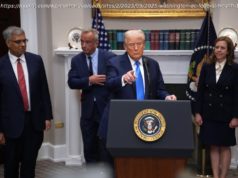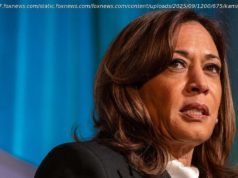Britain First, which believes that white Christian civilization is under threat from Islam, had been marginal. Now it has gotten an unexpected lift from the White House.
LONDON — She organized “ Christian patrols,” marched with crosses through heavily Muslim neighborhoods and accosted veiled women to rail against Islam. She was barred from entering any mosque in England. She has been arrested several times, most recently this month, on charges of making threats and abusive remarks.
Still, Jayda Fransen, the 31-year-old deputy leader of Britain First, a fringe group that insists that white Christian civilization is under threat from Muslims, had gotten relatively little attention.
That changed on Wednesday, when Britain First got unexpected publicity from President Trump, who recirculated three sometimes misleading videos Ms. Fransen had posted on Twitter that purported to show Muslims engaged in violence.
Hours later, Ms. Fraysen took to Twitter to thank him. “You’ve shed light on my plight here in Britain, in that I am facing prison for giving a speech in which I criticized Islam,” she wrote. “This is evidence that Britain has become Sharia-compliant,” she added, referring to Islamic law.
Mr. Trump’s tweets drew a rare rebuke from a staunch ally, as Britain’s prime minister and British lawmakers from across the spectrum said that he had given a platform to a hate group, one so extreme that it has been shunned even by other far-right organizations, and has attracted the notice of law enforcement.
Matthew J. Goodwin, a scholar at Chatham House who studies far-right politics in Britain, said that Britain First was “not really a populist right movement but basically a neo-Nazi one.”
It emerged in 2011 as an offshoot of the far-right British National Party, and while it has shown some interest in electoral politics, it is best known for confrontational tactics that have left the authorities aghast and unsettled.
“On the scale of far-right groups this is one on the very far right,” Mr. Goodwin said, citing tactics like what the group calls “invasions” of mosques. “Britain First is seen as a pseudo-paramilitary group.”
He added: “They have got what they want, which is global media attention.”
Through a spokesman, Mrs. May said that “Britain First seeks to divide communities by their use of hateful narratives that peddle lies and stoke tensions.” Britain’s foreign secretary, Boris Johnson, called Britain First “a divisive, hateful group whose views are not in line with our values.”
Some lawmakers from the opposition Labour Party went further, urging Mrs. May, who leads the Conservative Party, to rescind an invitation to Mr. Trump to pay a state visit to Britain. “The US President is normalizing hatred,” one lawmaker, Chuka Umunna, wrote on Twitter. “If we don’t call this out, we are going down a very dangerous road.”
In Britain, right-wing groups have come under increasing scrutiny amid concerns that anti-immigrant sentiment and xenophobia are gaining traction in the fraught climate surrounding the decision to leave the European Union.
In September, four Army soldiers were arrested on suspicion of being involved “in the commission, preparation and instigation of acts of terrorism.” At the time, the police said the men were suspected of being members of National Action, a far-right group that was banned last year and is known for anti-Semitic, homophobic and racist views.
In November, Thomas Mair, a man with a history of extreme right-wing beliefs, was convicted of murdering Jo Cox, a Labour Party lawmaker, one week before Britain’s June 2016 referendum on whether to leave the bloc. Witnesses told the police that Mr. Mair had shouted “Britain first!” as he stabbed and shot Ms. Cox to death. (He was not known to have any direct ties to the organization, and the group denied any link.)
Britain First has come to the attention of the authorities on several occasions in recent years.
In 2015, the police in Bedfordshire, a county north of London, obtained an injunction barring Ms. Fransen and the group’s leader, Paul Golding, from entering any mosque or Islamic center in England and Wales without invitation.
The judge, Justice Robin Knowles of the High Court, also prohibited them from publishing or distributing material likely to stir racial hatred, and from using threatening, abusive or insulting words or behavior.
Justice Knowles accepted the police argument that managing Britain First’s demonstrations had placed a large burden on the police at a time of budget constraints. The judge declined, however, to bar Mr. Golding and Ms. Fransen from entering the town of Luton for an anti-Muslim march, as the police had requested.
The admonishment by the court did not deter Ms. Fransen.
Last year, she returned to Luton for a so-called Christian patrol attended by about 20 associates, who distributed mock newspapers with the headline: “World War Three Has Begun — Islam Against the World.”
In a confrontation the group recorded on video, Ms. Fransen hurled abuse and waved a cross at a woman who was wearing a hijab. She shouted that Muslim men made women cover themselves so that they were not raped.
“She came across shouting at me, saying ‘Why are you covered?’ and she said that quite a few times,” the woman, Sumayyah Sharpe, testified . “I told her it was my choice that I cover. I then turned to the camera and I said, ‘Film me, I’m British, I’m a British Muslim. It’s my choice to wear this clothing and it’s my right.’”
Ms. Fransen was convicted of “religiously aggravated harassment” and fined 2,000 pounds, or about $2,700.
She did not stop, the authorities said.
In May, she was charged with harassment, in Kent, in southeastern England, after she showed up outside the former house of a Muslim man who had been charged in the rape of a teenager.
This month, she was arrested in London over a speech she made at an antiterrorism rally in Belfast, Northern Ireland, in August. She was charged with “using threatening, abusive, insulting words or behavior” and is due in court in Belfast on Dec. 14, according to the London police.
Ms. Fransen has made some attempts at politics — she was her group’s nominee to run for the European Parliament in 2014, and for the London Assembly in 2016 — without success. Britain First calls itself “a patriotic political party and street movement” but has never come close to electing a member of Parliament.






